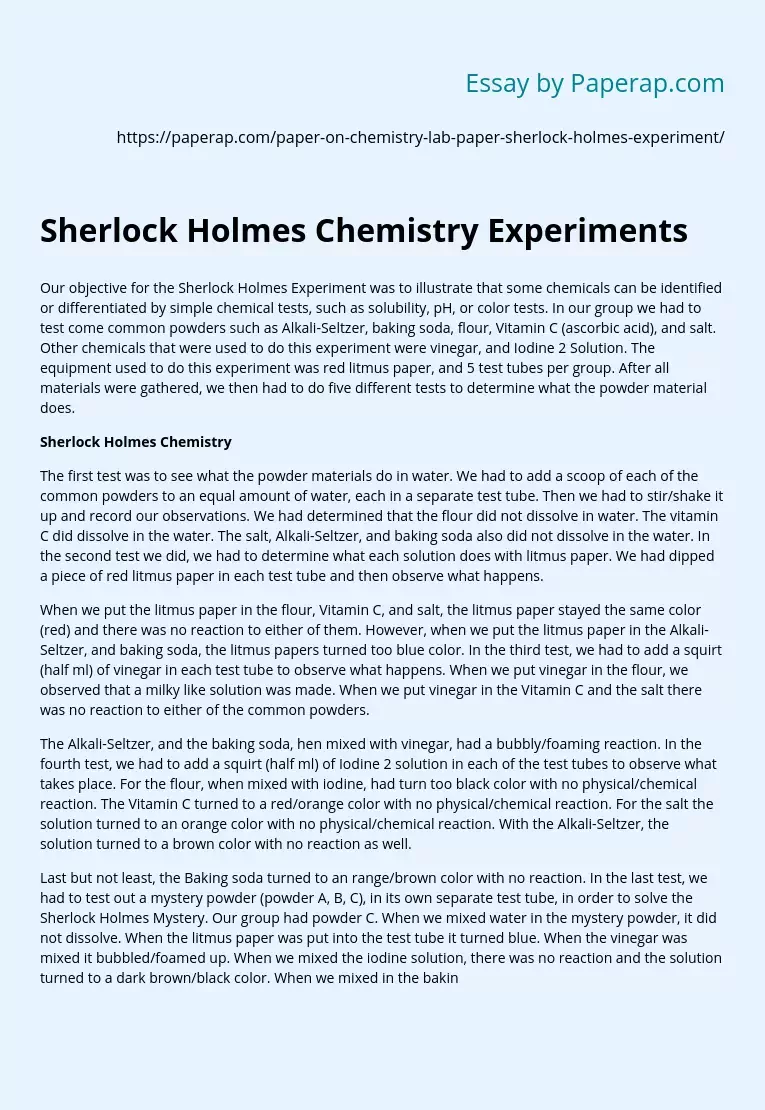Sherlock Holmes Chemistry Experiments
Our objective for the Sherlock Holmes Experiment was to illustrate that some chemicals can be identified or differentiated by simple chemical tests, such as solubility, pH, or color tests. In our group we had to test come common powders such as Alkali-Seltzer, baking soda, flour, Vitamin C (ascorbic acid), and salt. Other chemicals that were used to do this experiment were vinegar, and Iodine 2 Solution. The equipment used to do this experiment was red litmus paper, and 5 test tubes per group.
After all materials were gathered, we then had to do five different tests to determine what the powder material does.
Sherlock Holmes Chemistry
The first test was to see what the powder materials do in water. We had to add a scoop of each of the common powders to an equal amount of water, each in a separate test tube. Then we had to stir/shake it up and record our observations. We had determined that the flour did not dissolve in water.
The vitamin C did dissolve in the water. The salt, Alkali-Seltzer, and baking soda also did not dissolve in the water. In the second test we did, we had to determine what each solution does with litmus paper. We had dipped a piece of red litmus paper in each test tube and then observe what happens.
When we put the litmus paper in the flour, Vitamin C, and salt, the litmus paper stayed the same color (red) and there was no reaction to either of them. However, when we put the litmus paper in the Alkali-Seltzer, and baking soda, the litmus papers turned too blue color.
In the third test, we had to add a squirt (half ml) of vinegar in each test tube to observe what happens. When we put vinegar in the flour, we observed that a milky like solution was made. When we put vinegar in the Vitamin C and the salt there was no reaction to either of the common powders.
The Alkali-Seltzer, and the baking soda, hen mixed with vinegar, had a bubbly/foaming reaction. In the fourth test, we had to add a squirt (half ml) of Iodine 2 solution in each of the test tubes to observe what takes place. For the flour, when mixed with iodine, had turn too black color with no physical/chemical reaction. The Vitamin C turned to a red/orange color with no physical/chemical reaction. For the salt the solution turned to an orange color with no physical/chemical reaction. With the Alkali-Seltzer, the solution turned to a brown color with no reaction as well.
Last but not least, the Baking soda turned to an range/brown color with no reaction. In the last test, we had to test out a mystery powder (powder A, B, C), in its own separate test tube, in order to solve the Sherlock Holmes Mystery. Our group had powder C. When we mixed water in the mystery powder, it did not dissolve. When the litmus paper was put into the test tube it turned blue. When the vinegar was mixed it bubbled/foamed up. When we mixed the iodine solution, there was no reaction and the solution turned to a dark brown/black color. When we mixed in the baking soda there was no reaction and it turned to an
In conclusion, after we had tested the mystery powder, we had to solve the mystery of who stole Kamala Jackson’s pad. There were four suspects which were, Ruby, alma, Manly, and Beau, who were seen at the time the pad disappeared. I then cancelled out all the common powders that had no comparison to the mystery powder. The flour, vitamin C, and salt did not have any comparison which left only the Alkali-Seltzer and the baking soda. The comparisons of the Alkali-Seltzer and the baking soda were very similar. They were Just about the same as the mystery powder.
So I then narrowed down the two suspects, Beau, and alma, who could have possibly stolen Jamb’s pad. My accusations of the culprit narrowed down to Beau. I say this because even though alma was baking cookies, she did not use baking soda to make her cookies, as you would think when someone is cooking they might use baking soda as an ingredient. So then I did my research. Beau is the only person left because at the time of the disappearance of the pad, Beau was using Alkali-Seltzer tablets. Alkali- Seltzer tablets contain citric acid and sodium bicarbonate (baking soda), which lead to my accusation that the culprit is Beau.
Sherlock Holmes Chemistry Experiments. (2019, Dec 05). Retrieved from https://paperap.com/paper-on-chemistry-lab-paper-sherlock-holmes-experiment/

